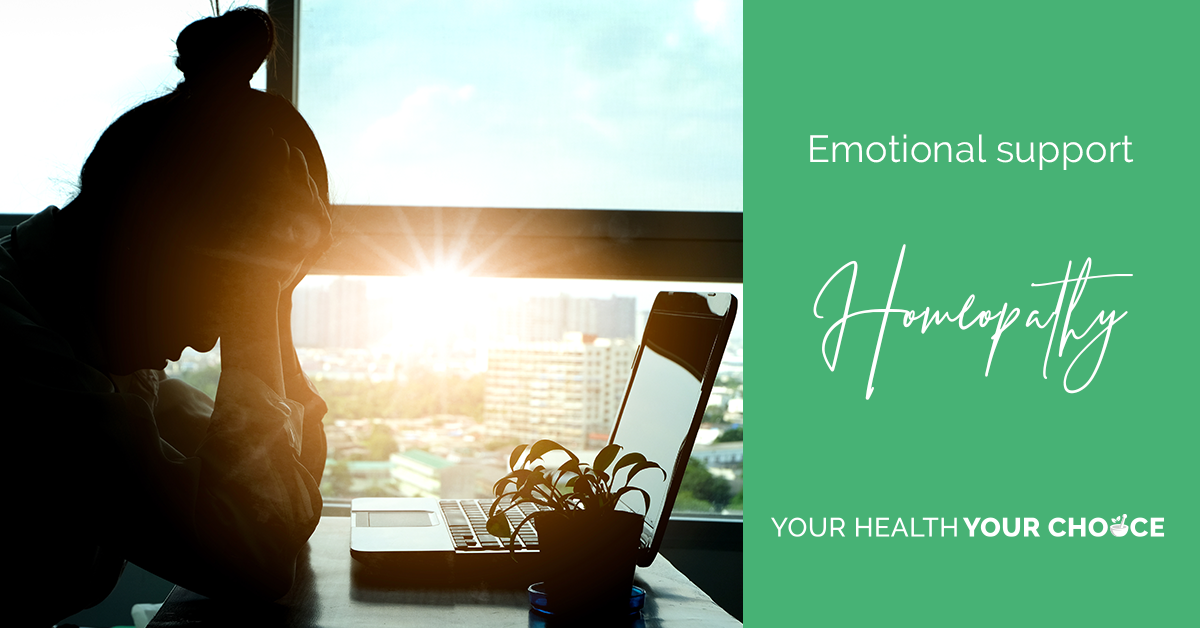Emotional support during difficult times – homeopathy

As a global community, we are navigating tough times of uncertainty, economic fallout, loss of personal freedoms, and isolation during the current COVID-19 pandemic. As a result, people may be feeling afraid, worried, anxious and overwhelmed.
Some groups may be more vulnerable than others to the psychological effect of this pandemic. These include people who contract the disease, those at heightened risk including the elderly and people living with underlying health conditions, and those with pre-existing psychiatric or substance abuse problems.
Health care providers are also particularly vulnerable mentally given their risk of exposure to the virus, concern about infecting and caring for their loved ones, shortages of personal protective equipment, and longer work hours.
But anyone of us may fall victim to the roller-coaster of emotions commonly experienced in a crisis. Mandated isolation, while necessary, is an unfamiliar and restrictive model of existence over an indefinite period. Many in our communities are struggling with this, possibly compounded with loss of income, or even loss of a loved one.
Everyone’s experience and circumstances will be different and symptoms may range from mild feelings of anxiety and stress, to more severe feelings of panic (even panic attacks), debilitating depression and possible suicidal ideation.
These states can also give rise to physical symptoms including acid indigestion, problems with swallowing, diarrhoea, a feeling of tightness in the throat, difficulty breathing, weight loss, and a sense that “something serious is wrong with me”.
Can homeopathy address these complaints?
Homeopathy is a traditional system of medicine that has been practiced worldwide for over 200 years. It incorporates mental and emotional aspects of the health of patients, viewing the body and mind as dynamically interconnected.
Homeopathic medicines originate from a variety of natural sources, mainly plants, minerals and animal products. Homeopathy regards any substance capable of producing symptoms in a healthy person as having the potential to counter similar symptoms in a sick person. The medicines are prepared through a process of serial succussion and dilution.
Clinical trials, including both randomised controlled trials (RCTs) and observational studies, have shown that homeopathy may significantly help symptoms of anxiety and depression.
For example, 2014 double-blind, placebo-controlled RCT reported positive and statistically significant results in homeopathic treatment for anxiety and depression disorders. A 2013 observational study found notable improvements in sleep and anxiety after just one month of homeopathic treatment.
Working alongside conventional medicine:
One of the strengths of homeopathic treatment is that it can be used alongside, and often complements, conventional care: people do not need to take a ‘one or the other’ approach (a common misconception). Accordingly, an Australian survey of homeopaths highlighted that 84% of homeopathic practitioners had patients who were already taking antidepressants for their depression. Most homeopaths across the globe will attest to their patients already taking conventional medication and using homeopathy as concomitant treatment.
Furthermore, there is scope for people to reduce their drug loads. A large French study formally concluded:
“Patients with ADDs [anxiety and depression disorders] choosing to consult GPs who prescribe homeopathy in addition to conventional medicine reported use of fewer psychotropic drugs and were marginally more likely to experience clinical improvement than patients managed with conventional care.”
The French study found that by 12 months, psychotropic drug utilisation in the group of people treated only with homeopathy by homeopathic GPs remained well under 50%, whereas patients in two other groups managed in conventional care settings reached relatively similar higher values (68.0 and 63.5 % respectively).
A snapshot of homeopathic remedies for acute anxiety and depression
This is not a complete list of remedies by any means. Below is a small selection of remedies commonly used in a variety of acute situations. For chronic care do not self-prescribe and please seek professional help.
The following remedies have been chosen to address common emotional states triggered by the COVID-19 pandemic (please note: these are not recommended for treating COVID-19, for which you should seek medical care):
FEAR & ANXIETY:
Aconite: when sudden fears overtake us rapidly. Intense fear (including irrational fear of death); as well as palpitations, shortness of breath, flushed face, and trembling.
Arsenicum album: anxiety accompanied by gastric symptoms such as diarrhoea and indigestion. Anxiety can manifest with panic attacks. There may be exhaustion but also restlessness, and perhaps much fretting and anguish over their health or the health of others. During acute episodes they may be critical, fastidious and controlling. Ailments from sudden financial loss can result in this state.
Calcarea carbonicum: Craves stability, routine and protection; therefore truly dreads disaster. Anxious when things are not going according to plan. Neatness out of concern for contagion and a need for order. Anxiety may manifest as anger, envy, hatred, withdrawal, unresponsiveness, despair, or indifference.
Gelsemium: Apprehensive and timid, these people feel they do not have the resources to do what they feel they’d like or need to do. Vertigo, weakness, trembling, chills, diarrhea, drowsiness, and even speechlessness from fright. When trembling, they want to be held.
DEPRESSION & SADNESS:
Ignatia: Where depression follows from bereavement, loss, or a shock. Those needing this remedy will typically demonstrate emotional ups and downs with mood swings, which may express as laughter alternating with tears. They will appear calm one minute but can quickly become very upset, even inconsolable. They will bottle their sadness up, finding it hard to talk and may express this as sighing. Poor sleep is common and so is the sensation of a ball or something stuck in their throat, known conventionally as ‘globus syndrome’.
Natrum muriaticum: People needing this remedy can bottle things up and suppress their emotions. This is one of my most frequently used homeopathic treatments for symptoms of stress, such as those typified by mild depression. A good remedy for bereavement. May be used if they have never been well since a shock or loss and feel as if they have a glass wall between them and the rest of the world. They may find it very difficult to cry and therefore grief is not processed. They feel worse for sympathy yet are very empathetic people. They sometimes build up a barrier emotionally and can appear somewhat cold and distant. They can worry about upsetting people unintentionally by saying the wrong thing and can take things the wrong way. Anxieties are often cloaked by migraines, tingling in the extremities, palpitations, insomnia, and isolation or feigned indifference. These people tend to bottle up their emotions and try to process them in isolation.
Other strategies to cope:
Actively manage your wellbeing by maintaining routines where possible, connect with family and friends (even if not in person), staying physically active, eating nutritious foods and seeking additional support by contacting Lifeline or further professional support as required.
Lifeline suggests the following:
Stay connected through the COVID-19 crisis. As connection is so important during this time, here are some tips on staying connected to others (remember – we are all in this together):
If there is someone you think may struggle through social isolation, it is important to reach out to them and let them know you care:
– Call them to check on their welfare
– Send an email
– Leave a note under their door
– Don’t underestimate the power you have to offer hope to another person.
We encourage people to get creative with how they interact, here are some ways to stay connected if self-isolating:
– Set up a gratitude tree – where every member posts a message or sends a text to other members to share something that they are grateful for.
– Find a buddy, or group of, to set daily challenges with. These could include a healthy habit, a mindful practice, a creative pursuit. Be sure to encourage and check in daily to stay motivated.
– Set dates and times to watch the same TV shows/movies with someone and message each other your thoughts along the way… kind of like Goggle Box but you’re not sharing the couch!
– If your local community has one, join its social media group! This will keep you up to date with what’s going on directly around you. It may also include ways you can perhaps reach out and connect with someone less fortunate than you and ways to assist them.
Where to go for support?
It is extremely important to seek out help if you feel you need it. Lifeline are committed to ensuring services continue as normal during this time.
– 13 11 14 will continue to be operating 24 hours a day, 7 days a week
– Lifeline Text 0477 13 11 14 will continue to operate 6pm – midnight (AEDT), 7 nights a week
– Lifeline webchat will continue to operate 7pm – midnight (AEDT), 7 nights a week
– Kids Helpline – for children that may need support 1800 55 1800 https://kidshelpline.com.au
– Beyond Blue – 1300 22 4636 https://beyondblue.org.au
« Return to News & Features
